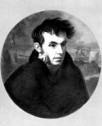Vasily Zhukovsky

Vasily Andreyevich Zhukovsky (Russian: Васи́лий Андре́евич Жуко́вский; February 9 [O.S. January 29] 1783 – April 24 [O.S. April 12] 1852) was the foremost Russian poet of the 1810s and a leading figure in Russian literature in the first half of the 19th century. He held a high position at the Romanov court as tutor to the Grand Duchess Alexandra Feodorovna and later to her son, the future Tsar-Liberator Alexander II.
Zhukovsky is credited with introducing the Romantic Movement into Russia. The main body of his literary output consists of free translations covering an impressively wide range of poets, from ancients like Ferdowsi and Homer to his contemporaries Goethe, Schiller, Byron, and others. Many of his translations have become classics of Russian literature, arguably better-written and more enduring in Russian than in their original languages.
Zhukovsky was born in the village of Mishenskoe, in Tula Oblast, Russia, the illegitimate son of a landowner named Afanasi Bunin and his Turkish housekeeper Salkha. The Bunin family had a literary bent and some 90 years later produced the Nobel Prize-winning modernist writer Ivan Bunin. Although raised in the Bunin family circle, the infant poet was formally adopted by a family friend for reasons of social propriety and kept his adopted surname and patronymic for the rest of his life. At the age of fourteen, he was sent to Moscow to be educated at the Moscow University Noblemen's Pension. There he was heavily influenced by Freemasonry, as well as by the fashionable literary trends of English Sentimentalism and German Sturm und Drang. He also met Nikolay Karamzin, the preeminent Russian man of letters and the founding editor of the most important literary journal of the day, The Herald of Europe (Вестник Европы).
In December 1802, the 19-year-old Zhukovsky published a free translation of Thomas Gray's "Elegy Written in a Country Churchyard" in Karamzin's journal. The translation was the first sustained example of his trademark sentimental-melancholy style, which at the time was strikingly original in Russian. It made him so well known among Russian readers that in 1808 Karamzin asked him to take over the editorship of The Herald of Europe. The young poet used this position to explore Romantic themes, motifs, and genres—largely by way of translation.
Zhukovsky was among the first Russian writers to cultivate the mystique of the Romantic poet. Much of his original work was inspired by his half-niece Maria "Masha" Protasova, the daughter of one of his several half-sisters, with whom he had a passionate but ultimately Platonic affair. He also came under the influence of Romanticism in the medieval Hansa cities of Dorpat and Revel, now called Tartu and Tallinn, which had recently been brought into the Russian Empire. The university at Dorpat (now Tartu University) had been reopened as the only German-speaking university in Imperial Russia.
 čeština
čeština Deutsch
Deutsch français
français magyar
magyar polski
polski русский
русский English
English Azərbaycan
Azərbaycan беларуская
беларуская italiano
italiano ქართული
ქართული қазақ
қазақ Nederlands
Nederlands português
português slovenčina
slovenčina 中文
中文 español
español







